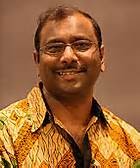The president of the World Communion of Reformed Churches (WCRC), Jerry Pillay, embarked on the road to a career of service in the church at a very young age. It was as a 10-year old boy that he felt the call of God to ordained ministry.
Today he heads the senior governing body of a global church network that represents 80 million Christians in 108 countries.
“My biblical conviction and theological training directed me to the need to be involved in global issues. Particularly, my experience in South Africa under apartheid alerted me to the necessity to be connected with other churches and faiths in addressing the evils and oppression of a political system which dehumanized the majority of black people in our country,” says Pillay.
The South African pastor is in Dodowa, Ghana May 7-15 to preside over the annual meeting of WCRC’s executive committee. The 30-member group from 20+ countries has gathered to review plans for the organization’s future in light of financial constraints that have forced a move of the organization’s international offices from Geneva, Switzerland to Hanover, Germany.
The objective is to cut staff costs and reduce currency exchange losses in an effort to ensure stability in the years ahead.
Pillay is a firm believer in the value of WCRC to churches and secular society in Africa. Citing the organization’s reputation for combining Biblical reflection with action on issues such as gender rights and the impact of the global financial system on people and the environment, he says, “WCRC provides a world platform for us to raise issues in Africa onto the international agenda which impacts locally in a very significant way.”
The Christian mission activist underlines his point by referring to WCRC’s history of challenging apartheid in his home country and of working with governments, churches and non-governmental organizations to address the HIV and AIDS pandemic and the causes of poverty.
It is appropriate that WCRC should be meeting in Africa, Pillay notes. “The global south seems to be the new seat of Christian growth, so this meeting allows churches in the southern hemisphere to share what works here and to help churches in the global north where Christianity is in decline.”
From the time he was a student at the University of Durban-Westville in preparation for ministry, Pillay has been involved with ecumenical organizations. He has formed and led ecumenical groups wherever he has served in congregations and has represented his denomination in ecumenical bodies both inside and outside of South Africa.
Following ordination in the then Presbyterian Church of Southern Africa (PCSA) he went on to complete a Ph.D. in missiology and New Testament studies at the University of Cape Town in South Africa.
Pillay currently serves as the General Secretary of the Uniting Presbyterian Church in Southern Africa (UPCSA). He served as a trustee for the Council for World Mission until June 2012 and presently serves on the Executive of the South African Council of Churches and the National Religious Leaders Forum in South Africa.
His ecumenical commitments also include mediating the processes of unity talks within the Dutch Reformed family in South Africa.
Reflecting on his contribution as an African leader of a global church movement, Pillay says that his experiences in a variety of contexts, both in Africa and other parts of the world, enable him “to think globally and provide a balanced perspective and direction for WCRC.”

